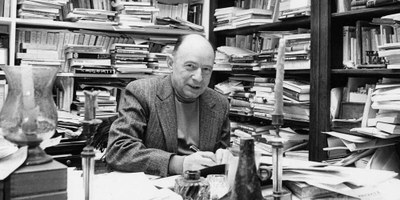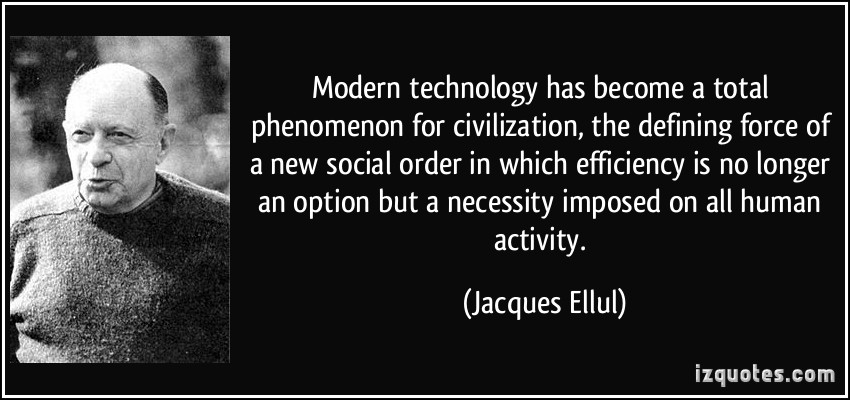Review
"Jacques EIlul is a French sociologist, a Catholic layman active in the ecumenical movement, a leader of the French resistance in the war, and -- one is tempted to add, after reading his book -a great man. Certainly he has written a magnificent book. ... The translation by John Wilkinson is excellent.
"With monumental calm and maddening thoroughness he goes through one human activity after another and shows how it has been technicized -- rendered efficient -- and diminished in the process.... "
-- Paul Pickrel, Harper's
"The Technological Society is one of the most important books of the second half of the twentieth century. In it, Jacques Ellul convincingly demonstrates that technology, which we continue to conceptualize as the servant of man, will overthrow everything that prevents the internal logic of its development, including humanity itself -- unless we take the necessary steps to move human society out of the environment that 'technique' is creating to meet its own needs."
-- Robert Theobald, The Nation
"...The effect is a contained intellectual explosion, a heated recognition of a tragic complication that has overtaken contemporary society."
-- Scott Buchanan, George Washington Law Review
Jacques Ellul
di Patrick Troude-Chastenet
BIOGRAFIA
(Originale disponibile su Fondazione Micheletti Altronovecento)
 Jacques Ellul nasce il 6 gennaio 1912 a Bordeaux da padre nativo di Trieste e madre figlia di una francese e di un portoghese. I genitori sono persone colte ma spesso senza soldi. Suo padre lo obbliga a seguire gli studi di diritto, che porterà a termine brillantemente. Decide addirittura di abbracciare la carriera di professore universitario, offrendosi così il lusso di essere remunerato dallo Stato (di cui è un avversaro risoluto) e di specializzarsi volontariamente in storia del diritto romano, materia che egli giudica la più inutile in una società capitalista.
Jacques Ellul nasce il 6 gennaio 1912 a Bordeaux da padre nativo di Trieste e madre figlia di una francese e di un portoghese. I genitori sono persone colte ma spesso senza soldi. Suo padre lo obbliga a seguire gli studi di diritto, che porterà a termine brillantemente. Decide addirittura di abbracciare la carriera di professore universitario, offrendosi così il lusso di essere remunerato dallo Stato (di cui è un avversaro risoluto) e di specializzarsi volontariamente in storia del diritto romano, materia che egli giudica la più inutile in una società capitalista.
Grande lettore di Marx, egli frequenta socialisti e comunisti senza peraltro «essere iscritto al pcf», come scrive «Le Monde» nella sua necrologia. All’inizio del 1934 unisce il gruppo di discussione che egli anima con Bernard Charbonneau al movimento diretto da Emmanuel Mounier, con cui litiga nel 1937, anno di pubblicazione del suo primo articolo sulla rivista «Esprit».
Pur non avendola inventata, i due personalisti girondini mettono in pratica, a partire dagli anni Trenta, la massima «pensare globalmente, agire localmente». Toltagli la cattedra dal regime di Vichy, partecipa alla Resistenza. È poi delegato municipale della città di Bordeaux (1944-1945). Nel 1954 pubblica il suo capolavoro, La Tecnica rischio del secolo. Per raggiungere il grande pubblico scrive degli articoli su «Le Monde», «Le Quotidien de Paris», «Ouest-France» e «Sud-Ouest», ma è alla stampa protestante che egli riserva l’essenziale della sua attività giornalistica. Dopo il maggio ‘68 dirige un comitato di difesa della costa dell’Aquitania.
Negli anni Settanta anima dei gruppi non-violenti cui partecipa, in particolare, José Bové. Dà il suo sostegno agli obiettori di coscienza e agli anti-militaristi. Nel 1976 presiede alla nascita dell’associazione ecologica europea Ecoropa. Muore il 19 maggio 1994 à Pessac, non lontano dal campus universitario di Bordeaux.
Bibliografia
Opere di Jacques Ellul
- Présence au monde moderne (1948) in Le défi et le nouveau, La Table Ronde, Paris 2007.
- La Technique ou l’enjeu du siècle, Économica, Paris 1990 (1954), tr. it. La tecnica rischio del secolo, Giuffré, Milano 1959.
- Propagandes, Économica, Paris 1990 (1962).
- L’illusion politique, La Table Ronde, Paris 2004 (1965).
- Autopsie de la révolution, La Table Ronde, Paris 2008 (1969), tr. it. Autopsia della rivoluzione, SEI, Torino 1974.
- De la Révolution aux révoltes, La Table Ronde, Paris 2011 (1972).
- Les nouveaux possédés, Mille et une Nuits, 2003 (1973).
- Le système technicien, Le Cherche-Midi, 2004 (1977), tr. it. Il sistema tecnico: la gabbia delle società contemporanee, Jaca Book, Milano 2009.
- La parole humiliée, Seuil, Paris 1981.
- Changer de révolution. L’inéluctable prolétariat, Seuil, Paris 1982.
- La raison d’être. Méditation sur l’Ecclésiaste, Seuil, Paris 1987.
- Le bluff technologique, Hachette, Paris 1988.
- Anarchie et christianisme, La Table Ronde, Paris 1998 (1988).
- La pensée marxiste, La Table Ronde, Paris 2003.
Opere su Jacques Ellul
- Goddard, A., Living the Word, Resisting the World. The life and thought of Jacques Ellul, Paternoster Press, Cumbria 2002.
- Hanks, J.M., Jacques Ellul: an annotated bibliography of primary works, Jai Press, Stanford 2000.
- Rognon, F., Jacques Ellul. Une pensée en dialogue, Labor et Fides, Genève 2007.
- Troude-Chastenet, P., Lire Ellul, Introduction à l’œuvre sociopolitique de Jacques Ellul, Presses universitaires de Bordeaux, Talence 1992.
- Troude-Chastenet, P., Entretiens avec Jacques Ellul, La Table Ronde, Paris 1994.
- Troude-Chastenet, P. (a cura di), Jacques Ellul, penseur sans frontières, L’Esprit du Temps, Le Bouscat 2005.
- Troude-Chastenet, P. (a cura di), La Politique, L’Esprit du Temps, Le Bouscat 200



 Jacques Ellul nasce il 6 gennaio 1912 a Bordeaux da padre nativo di Trieste e madre figlia di una francese e di un portoghese. I genitori sono persone colte ma spesso senza soldi. Suo padre lo obbliga a seguire gli studi di diritto, che porterà a termine brillantemente. Decide addirittura di abbracciare la carriera di professore universitario, offrendosi così il lusso di essere remunerato dallo Stato (di cui è un avversaro risoluto) e di specializzarsi volontariamente in storia del diritto romano, materia che egli giudica la più inutile in una società capitalista.
Jacques Ellul nasce il 6 gennaio 1912 a Bordeaux da padre nativo di Trieste e madre figlia di una francese e di un portoghese. I genitori sono persone colte ma spesso senza soldi. Suo padre lo obbliga a seguire gli studi di diritto, che porterà a termine brillantemente. Decide addirittura di abbracciare la carriera di professore universitario, offrendosi così il lusso di essere remunerato dallo Stato (di cui è un avversaro risoluto) e di specializzarsi volontariamente in storia del diritto romano, materia che egli giudica la più inutile in una società capitalista.